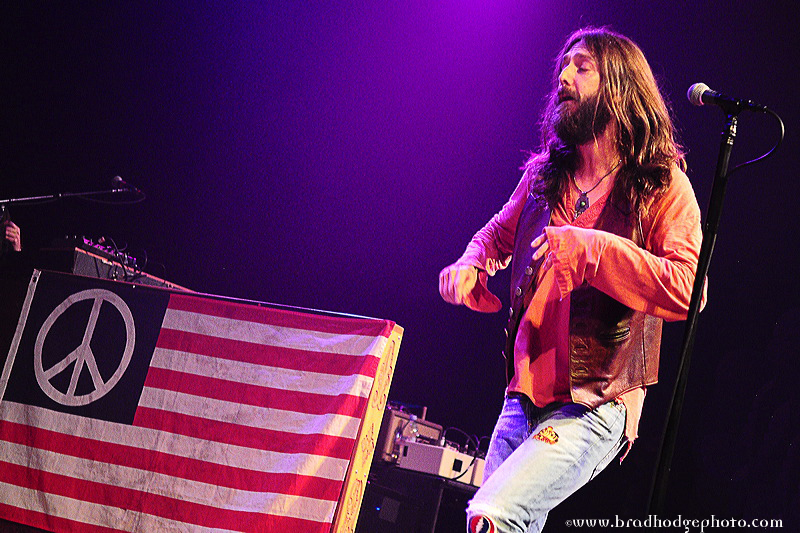
Photo by Brad Hodge
As The Black Crowes prepare to take the second (and some are rumoring final) extended hiatus of their 20-plus-year career, I thought it would be interesting to look back on the highs and lows of their live performances over the years and see how they have evolved as a band. I have been fortunate enough to see the Crowes 10 times between 1992 and 2010, and each show was a unique experience.
Orpheum Theatre, Boston, MA August 30, 1992
The aptly named “High As The Moon” tour stopped by The Orpheum, a venue the Crowes would play many times through 2005 (more on that later), and found an energetic, cocky young band celebrating the release of its second straight platinum album, The Southern Harmony Musical Companion.
Without exaggerating, this show ranks in the top five of probably 200 live performances I’ve seen over the years. From the first moment, which featured a dim spotlight revealing the outline of Rich Robinson crunching out the opening chords of “No Speak No Slave,” it was clear the Crowes had come to kick ass and take no prisoners.
Southern Harmony was a deeper, more groove-oriented album than its predecessor, the straightforward blues rocker Shake Your Moneymaker, and hinted at the future jam-oriented direction the Crowes would take. This show did also, featuring extended jams on “Thorn in My Pride” and the final encore of “Remedy,” as well as hard-rocking blasts through numbers like “Twice as Hard” and “Stare It Cold.”
A giant banner with a pot leaf emblem emblazoned with the logo “Legalize Now Free Us” hung behind the stage much of the night, and Chris Robinson actually stopped the show mid-song (for the life of me I cannot recall which one) to yell at security guards for cracking down on audience members who were smoking weed. After delivering a threat to end the show if one more person was stopped from smoking pot and inviting security to take the Crowes’ place on stage and perform for everybody, Robinson resumed the song and the rest of the concert continued without a hitch.
Orpheum Theater, Boston, MA, March 26, 1995
The Crowes were supporting Amorica, their third album which had a darker tone than the first two and which the band admitted was produced in a period of heavy drug use. This show found the Crowes sadder and wiser than the upstarts who had paraded through the Orpheum a few years earlier, opening with the downbeat “Cursed Diamond” and also featuring melancholy numbers like “Sister Luck” and “Sometimes Salvation.”
However, this was still a Crowes show, and they rocked out with tunes like “No Speak,” “Jealous Again” and “Sting Me.” Also an extended jam that opened “My Morning Song” demonstrated the band was steering out of Faces/Stones territory and setting a course for the Allmans/Dead Zone.
Great Woods, Mansfield, MA August 12, 1995
The Black Crowes took a big step forward as a jam band by headlining the HORDE Tour, founded as a jam showcase a few years earlier by Blues Traveler, who went on right before the Crowes.
Fitting an amphitheater show on a hot summer night, the tone was decidedly more upbeat than the Crowes’ Orpheum concert a few months earlier. The festival-length 11-song set opened with a rocking version of “A Conspiracy” and also featured “Moneymaker” classics like “Twice as Hard” and “Jealous Again,” as well as jammier tunes from “Amorica” like “High Head Blues” and “Gone.”
Extended jams were also featured during “Thorn in My Pride” and “Hard to Handle,” and a dancer in a crow costume with a giant head came out on stage to delight the crowd during the “Remedy” encore.
Polish American Beach Club, Gardner, MA July 18, 1996
This unusual venue is a lakeside resort in a small Massachusetts town that in theory should have been the perfect place to enjoy an outdoor concert on a summer evening. However, the musical performance was overshadowed and inhibited by an extremely intoxicated and violent crowd. Numerous fistfights broke out throughout the performance, and at least one female concertgoer was carried out on a stretcher with some type of head injury.
In a scene weirdly reminiscent of Altamont, Robinson signaled the band to stop playing at one point and implored the crowd to calm down and inform them, “If you want to beat the shit out of each other you don’t need us here, we can just go home.”
He later cut a song short to angrily warn crowd members who were throwing shoes at the stage that the band would leave if one more shoe got thrown (similar to his threat to security in 1992, but a far less humorous situation). Memories of the music are overshadowed by memories of the bad crowd vibe; this was probably not one of the Crowes’ better live performances but for very understandable reasons.


No Comments comments associated with this post